Check out the great review for From White Plains at BroadwayShowbiz.com!
From White Plains
By: ProfMiller @The Theater
It takes a lot of skill and smart self-editing to be able to write a play that deals with serious social issues while simultaneously engaging an audience at the personal level. What you wind up with all too often is something that is pedantic and preachy, an editorial posing as a play. But when a playwright is able to find the right balance, the results can be breathtaking.
Two stellar examples are Tony Kushner’s “Angels In America,” and Larry Kramer’s “The Normal Heart,” both of which were on soul-shaking display in recent revivals. Both plays dealt with the devastating topic of AIDS, and neither shied away from the medical details or the broader social and political issues involved; indeed both were quite passionate about them. But the playwrights’ greatest success was in bringing their stories to a human level by introducing us to characters we get to know and care about. The issues they face matter to us because the characters matter to us.
All this is by way of introduction to a new play, “From White Plains,” currently on view at the La Tea Theatre in the East Village, a work conceived and directed by Michael Perlman, who has been making a name for himself over the past few years as a performer (Outstanding Solo Show of 2006, New York Fringe Festival) and director.
“From White Plains,” a production of Fault Line Theatre, addresses the big social issue of bullying, especially of gay youth, by their peers. It raises questions of long-term consequences and culpability, male relationships (gay and straight), and even the power of social media to turn private matters into public ones.
The play opens on two long-time friends, both about 30 years of age, Ethan (Aaron Rossini) and John (Craig Wesley Divino). The pair is sitting on the sofa in Ethan’s apartment, drinking beers and casually watching the Academy Awards show on television. A filmmaker, Dennis (Karl Gregory), is being honored for a movie he has made about bullying. After a fumbling start to a seemingly unprepared speech, Dennis finds his voice. He speaks movingly of his friend Mitchell, who committed suicide after years of being bullied as a high school student in the New York suburbs of the title.
This is, of course, most appropriate for an Oscar speech before close to 40 million viewers. But Dennis has more to say. He wants to name names, and he identifies before the world the name of Mitchell’s chief tormentor.
And so, Ethan is outed. And nothing will ever be the same again.
Having set off this bomb, the play deals with the aftermath. Ethan loses his job, his girlfriend, and his best friend. Dennis, feeling empowered by his Oscar, uses social media to battle it out with Ethan. For his part, Ethan starts to fight back, but eventually he begins to do some soul-searching and attempts to apologize (although, of course, apologies under duress are always suspect.)
As in real life, things get complicated. Dennis’s new-found aggression turns on his boyfriend Greg (Jimmy King), whom Dennis badgers for not coming out to his parents, and John distances himself more and more from Ethan.
I have to say, it is quite possible to feel sympathetic towards Ethan, who is suddenly being held accountable for his actions from half a lifetime ago. Not that we want to let him off the hook, but we don’t know enough about Dennis’s friend Mitchell to be able to make a causal connection between the bullying and his suicide. It is not hard to understand how difficult a subject this is. You only have to consider the recent trial of the former Rutgers student who used a webcam to spy on his roommate in a sexual encounter with another man, and the suicide of that roommate after the video was posted.
Yet Ethan himself makes it challenging to feel too sorry for him. He still makes off-hand homophobic remarks, and confesses to John a long list of names of other individuals he bullied, starting in elementary school.
As the play moves towards a realistic ending, you have to admire Mr. Perlman and his co-creators from Fault Line Theatre. They make a real effort to allow everyone’s voice to be heard, so that everything is layered with complexity. I also like the way that the play shows the role of the Internet in the modern story of bullying, which can easily turn the tables from the old view of the bully as being the biggest and toughest kid in the room; YouTube and Facebook are equal opportunity outlets. The acting, too, is solid all around, and Mr. Rossini and Mr. Gregory make for a compelling pair of adversaries.
There was only one piece of the puzzle I wish had been brought up, and that is this: When all of this was going on, at a time when all of the individuals were still in school, where were the adults? Where were the teachers, the school administrators, the counselors, and the parents? I hold them as accountable as I do Ethan and others like him.
There really is a very recent movie called “Bully,” directed by filmmaker Lee Hirsch. Perhaps next year’s Oscars will find life imitating art.”
